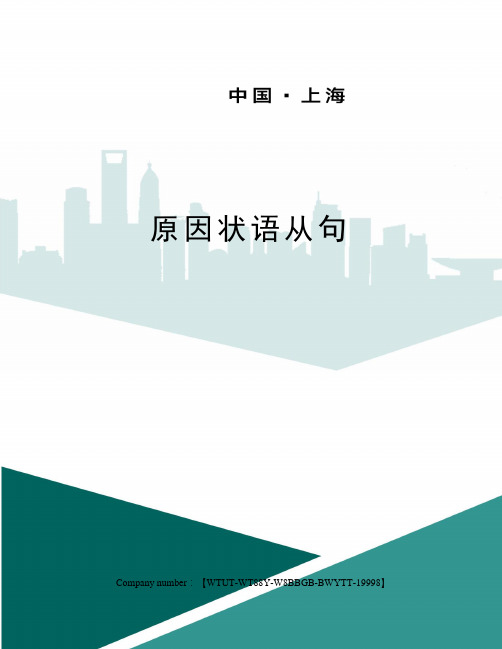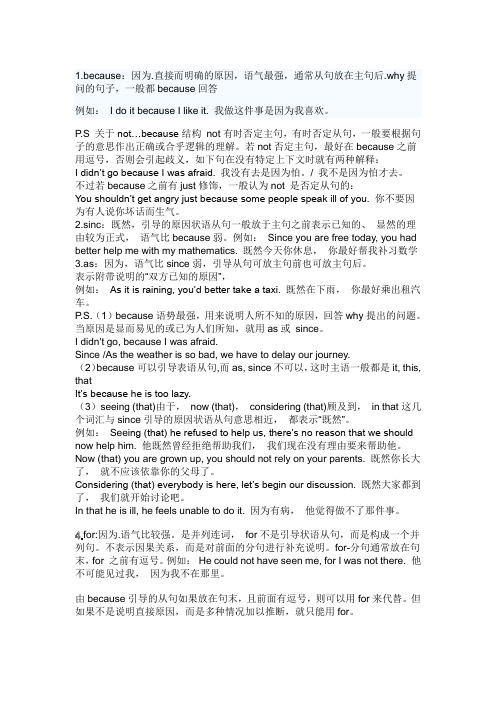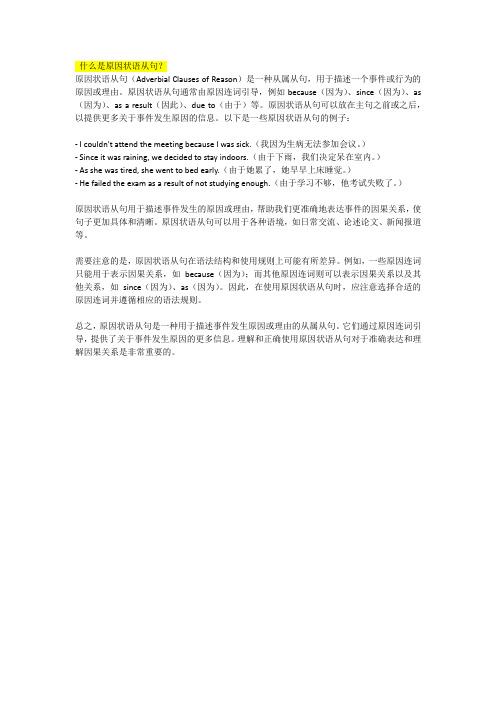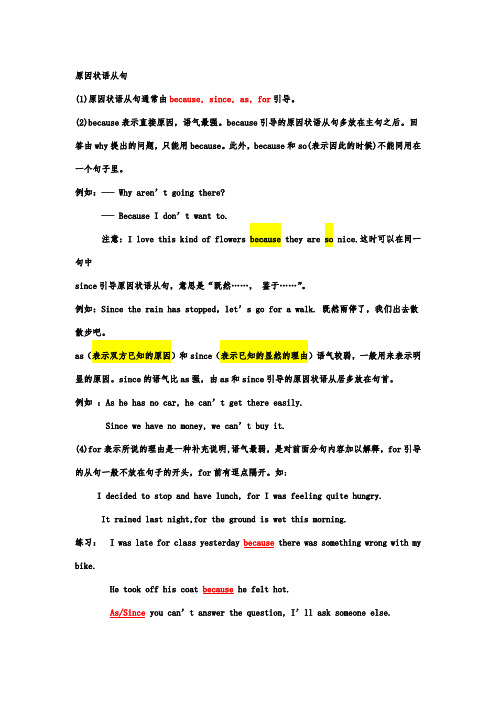原因状语从句
原因状语从句(完整)

原因状语从句(完整)
原因状语从句是一种从句,用来表示某种事件或情况的原因。
它通常由“因为”、“既然”、“由于”、“如果”等引导词开头,以下是一些常用的原因状语从句及其用法:
1.因为(because)
用法:因为引导的原因状语从句可以放在句首或句中,用来解释主句中的原因。
例句:因为他昨晚没睡好,今天一整天都很疲倦。
2.既然(since)
用法:既然引导的原因状语从句表示相信某个前提条件,因此陈述主句中的结果或结论。
例句:既然你已经完成了这项工作,我们就可以开始进行下一步了。
3.由于(due to)
例句:由于天气不好,我们无法进行户外活动。
4.如果(if)
例句:如果你需要帮助,尽管告诉我,我很乐意为你效劳。
5.只要(as long as)
例句:只要你好好学习,你就会成功。
6.尽管(even though)
例句:尽管天气不好,但我们仍然决定继续我们的计划。
7.虽然(although)
用法:虽然引导的原因状语从句表示一个与主句相反的情况,用来表达抱怨、惊讶等情绪。
例句:虽然我跟他说了很多遍,但他还是不肯听我的建议。
8.随着(as/with)
例句:随着科技的进步,我们的生活变得越来越便利。
总之,原因状语从句是一种非常重要的语法结构,它可以表达出各种事件或情况的原因,让句子的意思更加清晰明了。
希望通过以上的例句和用法介绍,能够帮助大家更好地掌握原因状语从句的用法。
原因状语从句

原因状语从句Company number:【WTUT-WT88Y-W8BBGB-BWYTT-19998】二、原因状语从句:1、定义:在句中用来说明主句原因的句子叫原因状语从句。
2、常用引导词: because(因为), as (由于), since (既然), now (that) (既然)3、时态:原因状语从句一般都是根据实际情况选用适当的时态。
通常是主过从过,主现从现。
4、because, since和as的区别:1) because引导的原因状语一般放于主句的后面,because从句位于句首时要用逗号分开,放在句末时,可不用逗号分开。
because表示直接原因,语气最强,最适合回答why引导的。
because of 也表示原因,但它后面不接从句, 只能接名词, 代词或动名词。
注意:because 和so 不可同时出现在一个句子里。
①I do it because I like it. = I like it so I do it.②We went by bus because it was cheaper. = It was cheaper so we went by bus.③ He can’t go to school because of his illness.2) since引导的原因状语一般放于主句之前表示已知的、显然的理由(通常被翻译成“既然”= now that ),较为正式,语气比because弱。
①Since you are free today, you had better help me with my mathematics.②Since you don't trust him, you should not employ him.③Now (that) you are grown up, you should not rely on your parents.3) as引导原因状语时表示附带说明的“双方已知的原因”,含有对比说明的意味,语气比since弱,较为正式,位置较为灵活(常放于主句之前)。
原因、目的和结果状语从句

B.He has so little time that he can’t go to the cinema with you.
(11) 如果主从句的主语相同,并且从句是否定的形式, 可以用too...to...句型转化。 too+形容词/副词+to do
原因状语从句
原因状语从句:从句表示的是主句行为的原因。通 常由because, since, as, for引导。
(1) because表示直接原因(听话人所不知的),语气 最强,引导原因状语从句多放在主句之后。 回答由why提出的问题,只能用because。此外, because和so不能同用在一个句子里。
Speak clearly so that they may understand you. (目的状语从句)
Jack is badly ill so that he has to rest. (结果状语从句)
用于目的状语从句,还有:
so as to…(肯定结构) eg. He got up early so as to catch the early train.
(4) for表示所说的理由是一种补充说明,for引导的从句一 般不放在句子的开头。 如: I decided to stop and have lunch, for I was feeling quite hungry.
Eg: 1. I was late for class yesterday _b_e_c_a_u_s_e there was
例如: He was so excited that he couldn't go to sleep that night. = He was too excited to go to sleep that night.
原因状语从句

1.because:因为.直接而明确的原因,语气最强,通常从句放在主句后.why提问的句子,一般都because回答例如:I do it because I like it. 我做这件事是因为我喜欢。
P.S 关于not…because结构not有时否定主句,有时否定从句,一般要根据句子的意思作出正确或合乎逻辑的理解。
若not否定主句,最好在because之前用逗号,否则会引起歧义,如下句在没有特定上下文时就有两种解释:I didn’t go because I was afraid. 我没有去是因为怕。
/ 我不是因为怕才去。
不过若because之前有just修饰,一般认为not 是否定从句的:Y ou shouldn’t get angry just because some people speak ill of you. 你不要因为有人说你坏话而生气。
2.sinc:既然,引导的原因状语从句一般放于主句之前表示已知的、显然的理由较为正式,语气比because弱。
例如:Since you are free today, you had better help me with my mathematics. 既然今天你休息,你最好帮我补习数学3.as:因为,语气比since弱,引导从句可放主句前也可放主句后。
表示附带说明的“双方已知的原因”,例如:As it is raining, you’d better take a taxi. 既然在下雨,你最好乘出租汽车。
P.S.(1)because语势最强,用来说明人所不知的原因,回答why提出的问题。
当原因是显而易见的或已为人们所知,就用as或since。
I didn't go, because I was afraid.Since /As the weather is so bad, we have to delay our journey.(2)because可以引导表语从句,而as, since不可以,这时主语一般都是it, this, thatIt’s because he is too lazy.(3)seeing (that)由于,now (that),considering (that)顾及到,in that这几个词汇与since引导的原因状语从句意思相近,都表示“既然”。
什么是原因状语从句

什么是原因状语从句?原因状语从句(Adverbial Clauses of Reason)是一种从属从句,用于描述一个事件或行为的原因或理由。
原因状语从句通常由原因连词引导,例如because(因为)、since(因为)、as (因为)、as a result(因此)、due to(由于)等。
原因状语从句可以放在主句之前或之后,以提供更多关于事件发生原因的信息。
以下是一些原因状语从句的例子:- I couldn't attend the meeting because I was sick.(我因为生病无法参加会议。
)- Since it was raining, we decided to stay indoors.(由于下雨,我们决定呆在室内。
)- As she was tired, she went to bed early.(由于她累了,她早早上床睡觉。
)- He failed the exam as a result of not studying enough.(由于学习不够,他考试失败了。
)原因状语从句用于描述事件发生的原因或理由,帮助我们更准确地表达事件的因果关系,使句子更加具体和清晰。
原因状语从句可以用于各种语境,如日常交流、论述论文、新闻报道等。
需要注意的是,原因状语从句在语法结构和使用规则上可能有所差异。
例如,一些原因连词只能用于表示因果关系,如because(因为);而其他原因连词则可以表示因果关系以及其他关系,如since(因为)、as(因为)。
因此,在使用原因状语从句时,应注意选择合适的原因连词并遵循相应的语法规则。
总之,原因状语从句是一种用于描述事件发生原因或理由的从属从句。
它们通过原因连词引导,提供了关于事件发生原因的更多信息。
理解和正确使用原因状语从句对于准确表达和理解因果关系是非常重要的。
原因状语从句

原因状语从句(1)原因状语从句通常由because, since, as, for引导。
(2)because表示直接原因,语气最强。
because引导的原因状语从句多放在主句之后。
回答由why提出的问题,只能用because。
此外,because和so(表示因此的时候)不能同用在一个句子里。
例如:--- Why aren’t going there?--- Because I don’t want to.注意:I love this kind of flowers because they are so nice.这时可以在同一句中since引导原因状语从句,意思是“既然……,鉴于……”。
例如:Since the rain has stopped,let’s go for a walk. 既然雨停了,我们出去散散步吧。
as(表示双方已知的原因)和since(表示已知的显然的理由)语气较弱,一般用来表示明显的原因。
since的语气比as强,由as和since引导的原因状语从居多放在句首。
例如:As he has no car, he can’t get there easily.Since we have no money, we can’t buy it.(4)for表示所说的理由是一种补充说明,语气最弱,是对前面分句内容加以解释,for引导的从句一般不放在句子的开头,for前有逗点隔开。
如:I decided to stop and have lunch, for I was feeling quite hungry.It rained last night,for the ground is wet this morning.练习:I was late for class yesterday because there was something wrong with my bike.He took off his coat because he felt hot.As/Since you can’t answer the question, I’ll ask someone else.The day breaks,for the bird sings.二、结果状语从句(1)结果状语从句由so…that, such…that, so that引导。
英语原因状语从句
英语原因状语从句
英语中的原因状语从句用来表示件事情发生的原因或理由。
在原因状
语从句中,常常使用以下引导词:
1. because: 因为
2. since: 因为
3. as: 由于;因为
4. given that: 鉴于;由于
5. seeing that: 鉴于;由于
6. considering (that): 考虑到;鉴于
7. due to: 由于;因为
8. owing to: 由于;因为
例如:
- Since it's raining outside, we should bring umbrellas. (由
于外面在下雨,我们应该带雨伞。
- As he had already left, I couldn't give him the message. (由于他已经离开了,所以我不能给他传达消息。
)
- Given that it's late, we should go home now. (鉴于已经很晚,我们现在应该回家了。
)
- Considering the price, this car is a good deal. (考虑到这
个价格,这辆车是个不错的交易。
)
- Due to bad weather, the flight was cancelled. (由于恶劣的
天气,航班被取消了。
)
- Owing to his hard work, he was promoted. (由于他的努力工作,他得到了晋升。
常用句型之十七原因状语从句
常用句型之十七原因状语从句原因状语从句是英语中常用的一种从句类型,可以对一个事件或情况进行解释,说明其背后的原因。
本文将介绍常见的原因状语从句句型,并通过例句来展示其用法。
原因状语从句通常由连词“because”、“since”、“as”、“due to”、“owing to”、“on account of”等引导。
句型一:(主句)+ because + (从句)例句:She couldn't come to the party because she was sick.她不能参加派对,因为她生病了。
He failed the exam because he didn't study enough.他考试不及格是因为他没有好好学习。
句型二:(主句) + since + (从句)例句:I have been feeling tired since I started my new job.自从我开始新工作以来,我一直感到疲倦。
He has been acting strangely since he broke up with his girlfriend.自从他和女朋友分手以来,他一直行为奇怪。
句型三:(主句) + as + (从句)例句:As it was getting late, we decided to leave.因为天色已晚,我们决定离开。
He couldn't find his keys as he had left them in the car.他找不到钥匙,因为他把它们落在了车里。
句型四:(主句) + due to + (从句)例句:The flight was delayed due to bad weather conditions.航班因天气恶劣而延误。
He was unable to attend the meeting due to a family emergency.因为家庭紧急情况,他无法参加会议。
语法中的原因状语从句
语法中的原因状语从句在语法中,原因状语从句是一种用来表达原因或因果关系的从句。
它可以帮助我们更准确地表达出某个事件或行为的原因。
本文将详细介绍原因状语从句的定义、结构、用法和例句,并说明如何正确运用原因状语从句来增强句子的逻辑性和表达能力。
一、定义原因状语从句,顾名思义,是用来表达事件或行为的原因的从句。
它通过回答“为什么”来解释某个行为或现象产生的原因。
二、结构原因状语从句一般由连词“因为”、“由于”、“既然”等引导,接在主句之后。
从句通常位于主句之后,对主句进行解释。
三、用法原因状语从句常用于复合句中,可以起到进一步解释句意的作用。
以下是一些常见的用法:1. 表示原因:他迟到了,因为他睡过头了。
他参加了培训班,由于他想提升自己的职业技能。
2. 引出解释:他没参加派对,是因为他不喜欢人群拥挤的场合。
她早退了,既然她生病了。
3. 表达原因假设:如果你不理解这个概念,那是因为你没有详细阅读说明书。
要想保持健康的身体,必须定期锻炼,因为运动有助于增强免疫力。
四、使用注意事项在使用原因状语从句时,需要注意以下几点:1. 识别引导词:例如“因为”、“由于”、“既然”等,这些词往往是引导原因状语从句的信号词。
2. 注意时态和语态:原因状语从句通常与主句保持一致的时态和语态。
3. 避免使用短语:原因状语从句应该是一个完整的句子,避免使用短语或单个词作为原因状语。
4. 注意逻辑关系:原因状语从句应该与主句之间有明确的逻辑关系,确保表达的原因与所述的行为或事件相符。
五、例句为了更好地理解原因状语从句的用法,以下是一些例句:1. 他没来上课,因为他生病了。
2. 他退学了,是因为他找到了一份全职工作。
3. 我决定留下来,因为我觉得这个城市很适合我。
4. 这个项目失败了,是因为缺乏足够的资金支持。
六、总结通过使用原因状语从句,我们可以更准确地表达行为或事件的原因。
在使用原因状语从句时,我们需要注意引导词的选择、时态和语态的一致性,以及与主句之间的逻辑关系。
原因状语从句-
So 强调的是形容词
• such…that “如此的…以致于”表结 果。 1.such+a(an)+形+可数名词 单数+that 2.such+形+复数名词/不可数名词+
that
• Such 强调的是名词
18
so…that / such…that
• 她是如此的疲惫, 以致于很快就睡着了。
•
She wasso_t_ir_e_d__t_h_a_t____ shfeell asleep
可数名词 不可数名词 Soon there were so many people that they ate all the food.
He has so little time that he can’t go to the cinema with you.
15
such…that “如此的…以致于”表结 果1.。such+a(an)+形+可数名词名词单数 +that Mr Green is such a good teacher that everybody likes him. It was such an interesting film that everyone laughed.
Since you are free today, you had better help me with my maths. 既然今天你休息, 你最好帮我补习数学。
6
大家有疑问的, 可以询问和交流
可以互相讨论下, 但要小声点
7
关于as as 引导原因状语从句时表示附带说明的“双方已知的原因”, 语气比since弱, 较为正式, 位置较为灵活(常放于主句之前)。
12
so....that 如此......以致于 1.so+形/副+that
- 1、下载文档前请自行甄别文档内容的完整性,平台不提供额外的编辑、内容补充、找答案等附加服务。
- 2、"仅部分预览"的文档,不可在线预览部分如存在完整性等问题,可反馈申请退款(可完整预览的文档不适用该条件!)。
- 3、如文档侵犯您的权益,请联系客服反馈,我们会尽快为您处理(人工客服工作时间:9:00-18:30)。
because 后跟句子
I was late for school because I got up late. because of 后跟名词
We didn’t go to the cinema because of the rain.
关于since
since引导的原因状语从句一般放于主句之前, 表示已知的、 显然的理由(通常被翻译成“既 然”), 较为正式,语气比because弱。
So 因此 It’s going to rain, so take an umbrella when you go out.
He worked too hard, so he fell ill again
so....that 如此......以致于 1.so+形/副+that
He was so glad that he couldn’t say a word. The hall is so big that it can hold 2,000 people. Mother lives so far away that we hardly ever see her.
Since you are free today, you had better help me with my maths. 既然今天你休息, 你最好帮我补习数学。
关于as as 引导原因状语从句时表示附带说明的“双 方已知的原因”,语气比since弱,较为正式, 位置较为灵活(常放于主句之前)。
•2.such+形容词+复数名词/不可数名词 •+that
Our town has such fresh air that every visitor wants to come.
1.so+形/副+that
2.so+形容词+a(an)+单数名词+that
3.so+many/few/much/little+复数 名词(不可名)+that
As it is raining, you’d better take a taxi. 既然在下雨, 你最好乘出租汽车。
I went to bed early, as I was very tired. 我睡得早, 因为我筋疲力尽了。
For “因为,由于”表明附加或推断的理由, 引导的分句前常有逗号。for分句不放 句首.
可数名词 不可数名词
Soon there were so many people that they ate all the food.
He has so little time that he can’t go to the cinema with you.
such…that “如此的…以致于”表结 果1.。such+a(an)+形+可数名词名词单数 +that Mr Green is such a good teacher that everybody likes him. It was such an interesting film that everyone laughed.
______________ quickly. 2. 这是一本非常有趣的小说,以致于我读了三遍。
It wassu__ch__a_n__in__te_r_e_s_t_in__g___ novel that
read it three times. 3. 他跑得非常快,没人能追上他。
He runsso__fa_s_t__th__a_t nobody can catch up with
状语从句分类
1. 表示时间 2. 表示原因 3. 表示结果 4. 表示目的 5. 表示让步 6. 表示比较 7. 表示条件
一:原因状语从句 定义:如果从句表达的是主句行为 的原因,就构成原因状语从句。 引导词:
because , since , as , for
关于because (1)because表示的原因是必然的因果关系,语气
2.so+形容词+a(an)+可数名词单数+tha He is so good a boy that every teacher likes him. It is so heavy a box that the little boy can’t carry it.
3.so+many/few/much/little+复名(不可名) +that
So 强调的是形容词
such…that “如此的…以致于”表结 果。 1.such+a(an)+形+可数名 词单数+that 2.such+形+复数名词/不可数名词+ that
Such 强调的是名词
so…that / such…that
1 was s_o__t_ir_e_d__t_h_a_t__ shefell asleep
It rained last night, for the ground is
wet this morning.
注意:汉语习惯上说“因为…… 所以”,但英语却不能将because, since, as, for等与so(所以)连用。
二:结果状语从句
定义:表示由某个行为而导致的结果 引导词: so so...that, such...that
(3)because从句可用作表语,其余不能。
This is because the earth is travelling around
the sun. (4) 表示“……的原因是因为……”这一意义时, 一般要用The reason why…is that… 如:
The reason why he cannot come is that he is ill.
最强,通常放在主句之后,有时也放在主句之前。 You want to know why I am leaving? I am leaving because I am tired.
(2)回答why提出的问题,只能用because, 不能用 其余三者。 A:Why can’t I go? B:Because you are too young.
